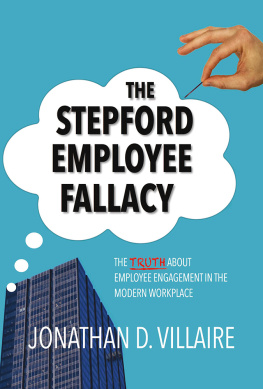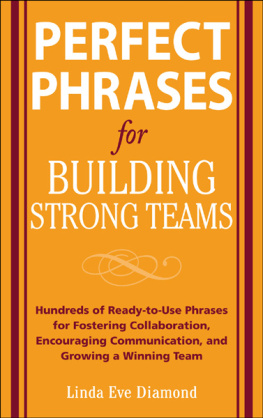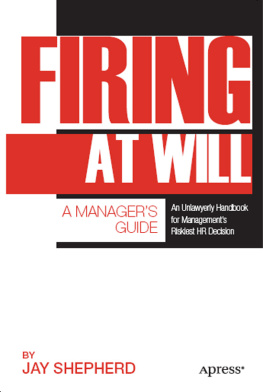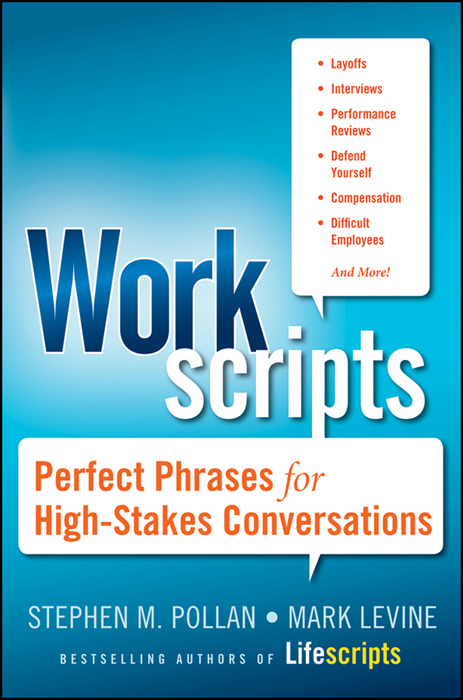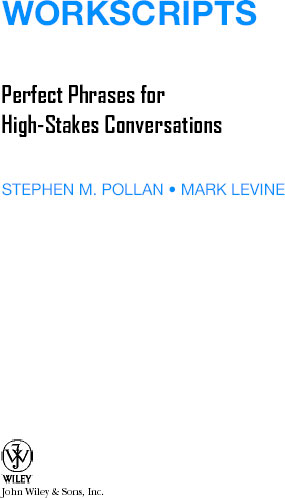WORKSCRIPTS
Copyright 2011 by Stephen M. Pollan and Mark Levine. All rights reserved.
Published by John Wiley & Sons, Inc., Hoboken, New Jersey.
Published simultaneously in Canada.
No part of this publication may be reproduced, stored in a retrieval system, or transmitted in any form or by any means, electronic, mechanical, photocopying, recording, scanning, or otherwise, except as permitted under Section 107 or 108 of the 1976 United States Copyright Act, without either the prior written permission of the Publisher, or authorization through payment of the appropriate per-copy fee to the Copyright Clearance Center, Inc., 222 Rosewood Drive, Danvers, MA 01923, (978) 750-8400, fax (978) 646-8600, or on the web at www.copyright.com . Requests to the Publisher for permission should be addressed to the Permissions Department, John Wiley & Sons, Inc., 111 River Street, Hoboken, NJ 07030, (201) 748-6011, fax (201) 748-6008, or online at http://www.wiley.com/go/permissions .
Limit of Liability/Disclaimer of Warranty: While the publisher and author have used their best efforts in preparing this book, they make no representations or warranties with respect to the accuracy or completeness of the contents of this book and specifically disclaim any implied warranties of merchantability or fitness for a particular purpose. No warranty may be created or extended by sales representatives or written sales materials. The advice and strategies contained herein may not be suitable for your situation. You should consult with a professional where appropriate. Neither the publisher nor author shall be liable for any loss of profit or any other commercial damages, including but not limited to special, incidental, consequential, or other damages.
For general information on our other products and services or for technical support, please contact our Customer Care Department within the United States at (800) 762-2974, outside the United States at (317) 572-3993, or fax (317) 572-4002.
Wiley also publishes its books in a variety of electronic formats. Some content that appears in print may not be available in electronic books. For more information about Wiley products, visit our web site at www.wiley.com .
Library of Congress Cataloging-in-Publication Data:
Pollan, Stephen M.
Workscripts : perfect phrases for high stakes conversations / Stephen M. Pollan, Mark Levine.
p. cm.
Includes index.
ISBN 978-0-470-63324-3 (cloth); ISBN 978-0-470-91262-1 (ebk);
ISBN 978-0-470-91263-8 (ebk); ISBN 978-0-470-91264-5 (ebk)
1. Communication in management. 2. Interpersonal communication. I. Levine, Mark, 1958 II. Title.
HD30.3.P646 2011
658.45dc22
2010020650
Preface
This book is, more than anything else, a survival map. The workplace of today isnt just different, its dangerous. I describe it in some detail in Chapter 1, but to make that long story, short: The rules that used to serve as guideposts have crumbled; the practices and behaviors that were standard, have been thrown to the side of the road. Most of us feel anxious and angry, and with good reason. It is scary out there in the working world, whether youve 25 years on the job or are have just graduated college.
Thats the bad news.
Heres the good news: There is a way to make it through this unknown territory and emerge in a better place.
It starts with understanding how the dynamics of workplace communications have changed and adapting your attitudes and behaviors to match the new reality. Thats what Ive tried to help you accomplish in the following pages.
The book is filled with a great deal of situation-specific advice; tactics for typical scenarios youll encounter, if not every day, then at least every month in your working life. There are also a number of recurring strategies which youll find running throughout the chapters.
But if theres one main lesson you need to absorb about workplace communication today, its this: everyone is talking at, not with each other.
In years past there were chances to change peoples minds and attitudes; opportunities to win others over to your point of view; times when you convince someone to modify their position. It might have required charm, subtlety, cunning, or flattery, but it could be done. Today, its almost never possible. Thats because everyone is looking out for number one. As a result, workplace communications today is more about posturing than persuading.
In the pages that follow I help you posture, or position yourself, to your best advantage, in every situation covered. My short-term goal, the one addressed in this book, is for you to achieve the best outcome possible in that scenario.
This book will arm you so that you may survive the worst workplace imaginable, as it gives you inordinate insight into managements reasoning and their fears.
There is a long-term answer: redefining yourself and behaving as a freelancer rather than an employee, even if youre on the payroll. But thats the subject for another book. Right now, weve just got to get through this uncharted territory in one piece.
Stephen M. Pollan
WORKSCRIPTS
Chapter 1
The New Workplace Environment
Forget everything you have ever learned about workplace communications. Ignore all the rules for office behavior youve followed for years. Throw away all the books you acquired in past decades on job interviews and networking. The world of work has been transformed in ways both large and small. In less than two years the workplace has undergone a shift that is as dramatic as the transition that happened when we moved from an agricultural to an industrial economy. A sea change has occurred and business has truly entered the twenty-first century.
The Great Recession of 2008 was the obvious tipping point for this transformation. However, in hindsight, its a change that has been building for years, perhaps even decades. Optimists may hope its only a temporary shift, a short-term symptom of a finite economic crisis, and that the world will soon return to the way it used to be. But it is realistic, not pessimistic, to accept that the economic crisis was the dawn of a new business world that will last for the rest of our working lives.
While this shift will impact every aspect of our money life, the most obvious day-to-day effect is in the way we communicate and relate to our fellow workers. Quite literally, the way we say things to each other in the workplace must be different now. Thats because how we all think and feel about our jobs, our careers, our employers, our peers, and our employees has changed.
Ive been closely examining workplace communications for more than two decades. My name is Stephen M. Pollan and Im an attorney, career coach, and financial advisor in private practice in New York City. While my practice has always been holistic, treating the personal and professional needs of my clients as a single cohesive whole, much of my work for the past 10 years has centered on the workplace. Thats because it has been, and continues to be, the arena in which my clients greatest fears and troubles play out. Besides taking a comprehensive approach, another thing that has always separated me from other advisors is that I offer extremely pragmatic advice. I tell my clients exactly what I think they should do and say. My clients and I develop scripts for their problematic dialogues, planning exactly what to say and how to respond in whatever situation they face.
This pragmatism and my scripting approach led me to write a book called Lifescripts , offering advice on what to say in a variety of difficult business and personal scenarios. I took a graphic approach to each conversation, plotting it out with a flow chart that followed all the possible responses, counters, and variations. The original book and its graphical approach was so successful that it spawned a number of successful sequels and follow-up editions, focusing on additional scenarios. Up until recently, I had assumed that Id addressed all the most common situations and offered scripts for every eventuality.




